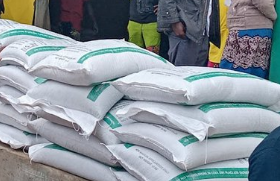 Bags of fertiliser/FILE
Bags of fertiliser/FILEGovernment Spokesperson Isaac Mwaura has announced that fertiliser donations from Algeria and Russia have saved Kenyan farmers Sh729 million and Sh2 billion, respectively, under the ongoing subsidised farm input programme.
Speaking at a press briefing on Saturday, Mwaura emphasized that the contributions from the two nations significantly reduced the financial burden on farmers amid high global fertiliser prices.
“We received 16,000 metric tonnes of fertiliser from Algeria. In partnership with Algeria, we produced 561,000 bags of top-dressing fertiliser, saving farmers Sh729 million,” said Mwaura.
His remarks came days after the government addressed claims that fertiliser donated by Russia in August 2023 during the Russia-Africa Summit was sold to farmers.
Mwaura clarified that Russia donated 33,835 tonnes of fertiliser raw materials, which were locally blended into over two million bags of subsidized fertiliser for crops such as maize, tea, and rice.
“This contribution saved the country approximately Sh2 billion. The raw materials were used to produce two million 50-kg bags of fertiliser for tea, coffee, maize, and other crops, which have since been subsidised,” he stated.
The clarification followed allegations by impeached Deputy President Rigathi Gachagua, who claimed the government sold donated farm inputs to farmers at inflated prices.
“These donations were handed to certain companies, rebranded, and resold to the government at market rates, generating billions in profits,” Gachagua alleged.
In response, the government acknowledged receiving Murate of Potash, Urea 46%N, and NPK 27:6:6:2S from Russia but stressed that the materials were in raw form and unsuitable for direct application on crops.
The state explained that blending and granulation were necessary to create crop-specific fertilizers tailored to various agricultural value chains.











